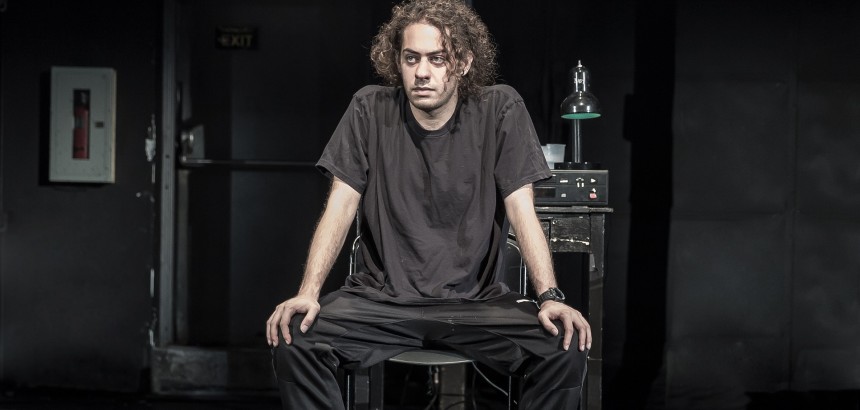This piece is also available in Farsi.
“Gentlemen, I am tormented by questions; answer them for me.”
― Fyodor Dostoyevsky, Notes from Underground
“20th of November” by means of deploying the technique of Brecht’s “Alienation Effect” places us, the audience, before a person who in an hour and twelve minutes is going to carry a bag full of guns to a school and open fire. We are seated there only to find ourselves incapable of changing the outcome, as the only thing that connects us to him is a “failed dialogue”. The character (played by Sina Gilani) considers himself a soldier of “the army of Losers”, and exposes the psychological, political, historical and philosophical layers of thought, which have made him plan this act of terror. In a Monologue, which starts with simple, innocent sentences, and then lead to outcries of madness; we are made to think, laugh, to confront a spontaneous, and undoubtedly a lasting anxiety.
This theatre gives the microphone to a person who is voice-less. A person who is not accustomed to speaking, who hates to speak. He sits among us, the audience, in one of the chairs on the circumference of a circle. He has occupied one of the seats; he is one of us. His soul is bothered. He feels that he has never been alive, that he has always been the subject of “social evaluation”. He knows from the beginning that although we may refrain from seeing him for a while, but sooner or later, a moment will come when we have no other choice but to stare at him. That is the exact moment when his bothered soul haunts us with his ingenuity; the ingenuity which reminds us of the hero of Dostoyevsky’s Notes from Underground:
“Perhaps I really regard myself as an intelligent man only because throughout my entire life I’ve never been able to start or finish anything.”
He knows that “to be overly conscious is a sickness, a real, thorough sickness”, yet in his corner, he has embraced this sickness, with a bitter and useless consolation.
During the show we listen to his arguments. Sometimes we find them repetitious. Sometimes we become overwhelmed by their philosophical tone. Sometimes we feel that he is just rephrasing his previous statements. Sometimes we categorize him by our psychoanalytical formulas, or simply consider him mad or mentally sick. We say to ourselves: “ He is not normal. He is not seeking to become better. He is not even seeking a critical discussion. He only wants to prove his point.” We dislike him. We blame him, and in our hearts we laugh at his foolishness.
Yet, it is in the middle of one of the aforementioned impressions that an anxiety catches us. We look around to the other audience. Then we look back at the character. The anxiety is lifting up in us. The fear that comes with this anxiety is as stable as it is childish: “May the actor who is shouting at us: “I hate you”, have a real gun at his hand?”
Why is this anxiety increasing? His voice haunts us: “Those who went to the Gas chambers had broken nose. They had no other chance but to breathe with their mouth, leading to sooner suffocation.”
The character gets up suddenly. He walks the diameter of the circle. We are horrified, lest he is coming to kill us. By a watered cloth, he writes on the wall: “Nothing is eternal.” All that we do, dream, and hope is but a scribe written by water, and will soon evaporate. Only that which is of the genus of incapability will last.
This theatre shows us one of the facts about the contemporary world: in the contemporary world the hero of Dostoyevsky is thrown into a Kafkaesque scene. Nowadays, the bothered hero of Notes from Underground is not putting the blame on those friends or organizations that humiliated him, but on the “system”, a macro abstract concept. Therefore the bothered soul cannot take revenge from “one person” – he even sympathizes with all and each of us – but he has to take revenge from an “unknown thing”. This is when we, the audience, understand the root of our anxiety: We, the audience, are part of that “unknown thing”. Deep down we know that none of us are innocent. This is why we know the character may for real point an actual gun to us.
Related posts

The Evil, The Egg, and The 20th of March




Pingback: Dostoyevsky and the Unknown thing – Mahdi Ganjavi
Time to face the music armed with this great initomarfon.
Pingback: Dostoyevsky and the Unknown thing | مهدی گنجوی